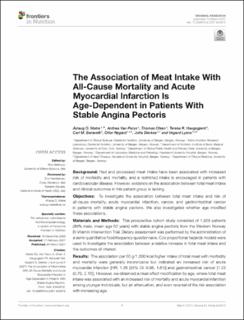| dc.contributor.author | Matre, Åslaug Oddsdatter | |
| dc.contributor.author | Van Parys, Anthea | |
| dc.contributor.author | Olsen, Thomas | |
| dc.contributor.author | Haugsgjerd, Teresa Risan | |
| dc.contributor.author | Baravelli, Carl Michael | |
| dc.contributor.author | Nygård, Ottar | |
| dc.contributor.author | Dierkes, Jutta | |
| dc.contributor.author | Lysne, Vegard | |
| dc.date.accessioned | 2021-08-06T11:19:36Z | |
| dc.date.available | 2021-08-06T11:19:36Z | |
| dc.date.created | 2021-03-04T08:52:36Z | |
| dc.date.issued | 2021 | |
| dc.identifier.issn | 2296-861X | |
| dc.identifier.uri | https://hdl.handle.net/11250/2766796 | |
| dc.description.abstract | Background: Red and processed meat intake have been associated with increased risk of morbidity and mortality, and a restricted intake is encouraged in patients with cardiovascular disease. However, evidence on the association between total meat intake and clinical outcomes in this patient group is lacking.
Objectives: To investigate the association between total meat intake and risk of all-cause mortality, acute myocardial infarction, cancer, and gastrointestinal cancer in patients with stable angina pectoris. We also investigated whether age modified these associations.
Materials and Methods: This prospective cohort study consisted of 1,929 patients (80% male, mean age 62 years) with stable angina pectoris from the Western Norway B-Vitamin Intervention Trial. Dietary assessment was performed by the administration of a semi-quantitative food frequency questionnaire. Cox proportional hazards models were used to investigate the association between a relative increase in total meat intake and the outcomes of interest.
Results: The association per 50 g/1,000 kcal higher intake of total meat with morbidity and mortality were generally inconclusive but indicated an increased risk of acute myocardial infarction [HR: 1.26 (95% CI: 0.98, 1.61)] and gastrointestinal cancer [1.23 (0.70, 2.16)]. However, we observed a clear effect modification by age, where total meat intake was associated with an increased risk of mortality and acute myocardial infarction among younger individuals, but an attenuation, and even reversal of the risk association with increasing age.
Conclusion: Our findings support the current dietary guidelines emphasizing a restricted meat intake in cardiovascular disease patients but highlights the need for further research on the association between meat intake and health outcomes in elderly populations. Future studies should investigate different types of meat separately in other CVD-cohorts, in different age-groups, as well as in the general population. | en_US |
| dc.language.iso | eng | en_US |
| dc.publisher | Frontiers Media | en_US |
| dc.rights | Navngivelse 4.0 Internasjonal | * |
| dc.rights.uri | http://creativecommons.org/licenses/by/4.0/deed.no | * |
| dc.title | The Association of Meat Intake With All-Cause Mortality and Acute Myocardial Infarction Is Age-Dependent in Patients With Stable Angina Pectoris | en_US |
| dc.type | Journal article | en_US |
| dc.type | Peer reviewed | en_US |
| dc.description.version | publishedVersion | en_US |
| dc.rights.holder | Copyright 2021 Matre, Van Parys, Olsen, Haugsgjerd, Baravelli, Nygård, Dierkes and Lysne | en_US |
| dc.source.articlenumber | 642612 | en_US |
| cristin.ispublished | true | |
| cristin.fulltext | original | |
| cristin.qualitycode | 1 | |
| dc.identifier.doi | 10.3389/fnut.2021.642612 | |
| dc.identifier.cristin | 1895520 | |
| dc.source.journal | Frontiers in Nutrition | en_US |
| dc.identifier.citation | Frontiers in Nutrition. 2021, 8, 642612. | en_US |
| dc.source.volume | 8 | en_US |

